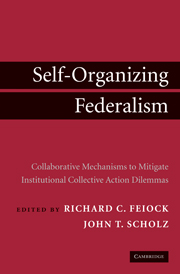 Self-Organizing Federalism
Self-Organizing Federalism from PART THREE - INTEGRATING REGIONAL POLICIES THROUGH NETWORKS, JOINT VENTURES, AND PARTNERSHIPS
Published online by Cambridge University Press: 29 January 2010
Understanding how political actors engage in collaborative behavior in fragmented policy arenas is extremely important, particularly when the use of finite public goods is at stake (Feiock and Scholz). Collaboration may reduce the potential occurrence of conflict among users by informing parties about better ways to avoid negative externalities and to take advantage of positive ones, creating the conditions under which more extensive cooperative behavior can develop. Given the important effects that collaborative initiatives may produce, it is only logical that the bulk of research in political science and public administration concentrates on studying how to overcome the initial obstacles to collaboration in the presence of excessive fragmentation.
However, less attention is paid to answering the question of how collaboration can be sustained over time. This is unfortunate, since the continuation of these practices, rather than their mere emergence, is what makes the solutions to institutional collective action (ICA) problems more valuable to stakeholders. Fortunately, important progress has recently been made by scholars in both political science and public administration on how collaboration can be achieved and extended (cf. Feiock 2004, 2007; Koontz et al. 2004; Sabatier et al. 2005; Scholz and Stiftel 2005). This research continues this trend by explaining how collaboration can be sustained when actors exchange resources that are needed for the successful implementation of joint ventures, one of the self-organizing mechanisms to solve ICA problems that are explored in this book.
To save this book to your Kindle, first ensure [email protected] is added to your Approved Personal Document E-mail List under your Personal Document Settings on the Manage Your Content and Devices page of your Amazon account. Then enter the ‘name’ part of your Kindle email address below. Find out more about saving to your Kindle.
Note you can select to save to either the @free.kindle.com or @kindle.com variations. ‘@free.kindle.com’ emails are free but can only be saved to your device when it is connected to wi-fi. ‘@kindle.com’ emails can be delivered even when you are not connected to wi-fi, but note that service fees apply.
Find out more about the Kindle Personal Document Service.
To save content items to your account, please confirm that you agree to abide by our usage policies. If this is the first time you use this feature, you will be asked to authorise Cambridge Core to connect with your account. Find out more about saving content to Dropbox.
To save content items to your account, please confirm that you agree to abide by our usage policies. If this is the first time you use this feature, you will be asked to authorise Cambridge Core to connect with your account. Find out more about saving content to Google Drive.